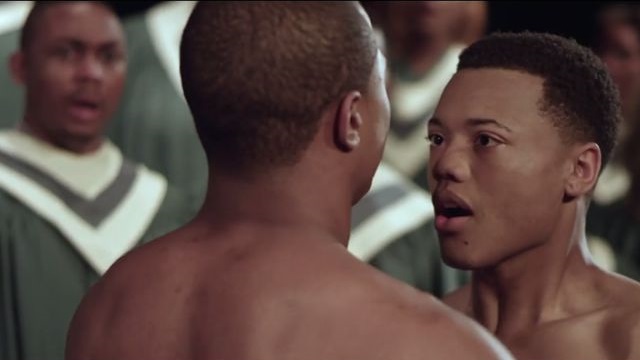Films made by Christians for Christians have a rhythm and heavy handed morality all their own, independent from the secular formula. These films, particularly popular among Evangelicals and Baptists, tend to have a central Christian character betray their religion, stray from the flock, have a miraculous moment of Coming to God, and return to the Church for salvation. The message is usually a condemnation of everything except a humble life of Christian-based sober monogamous heteronormativity. With a heavy hand, the central character will face many moral decisions, falling down the rabbit hole of immorality while they ignore neon warning signs pointing them back to a life dictated by this interpretation of the Bible. These movies are particularly prevalent in the Black Baptist communities where preachers deliver social issue sermons with passion, fire and brimstone, bringing the flock closer to God as much through their emotions as through the Good Book. Patrik-Ian Polk targets his new film, Blackbird, at these Christian audiences, seeking to use their own language to tell a tale of inclusive tolerance and acceptance.
Randy Rousseau (Julian Walker) is a teenage singer at a Christian high school struggling between his homosexual desires and his faith. He comes from a broken home where his six-year-old sister was kidnapped years ago, causing his mother, Claire (Mo’Nique), to go crazy and his father (Isaiah Washington) to leave the house. Claire’s insanity over the kidnapped sister causes her to go to the grocery store posting pictures on milk cartons and pleading with everybody to tell her where her daughter has gone. Randy, being the only sane one left in the house, has to care for Claire while minding his schoolwork and coming of age.
Randy’s struggle with his sexuality, highlighted by faith-induced celibacy and wet dreams involving his heterosexual friend, is contrasted by his gay, out, and happy best friend, Efram. Randy’s high school drama club tries to put on a gender-bent Romeo and Juliet, highlighting the progressive views of the youth aimed directly at the conservative views of the Church. After that falls through, Randy gets involved with a college student film starring an out gay white guy who becomes Randy’s seducer and mentor. Even more complications ensue involving almost every teenage danger trope in the Evangelical Christian high school film.
Polk is dedicated to replicating all of the rhythms and flaws of the Christian film. Tyler Perry’s Temptation: Confessions of a Marriage Counselor features a married black woman who loses her way, strays from her good husband, strays from the Church, ends up with AIDS, and is forced to get her AIDS medication from her now-ex-husband. Video Girl features a faithful ballerina who eschews her low-key small town life to become rich and famous in the hip-hop world, only to become addicted to sex, drugs, and glamour before she comes back to God. These movies are made with a tell-tale amount of cheap artifice, acting that wildly ranges between stilted and outsized, ham-fisted dialogue that readily points out the intent of every scene, and embellished emotions meant to rope the viewer in by their heart more than their head.
Blackbird replicates these stylistic elements perhaps almost too faithfully. But, Polk isn’t here to proselytize for the Church’s interpretation of faith as Gospel. Instead, he’s working to subvert all of the usual Christian heteronormative tropes by promoting a tolerance for all lifestyles and a realistic view of sexuality without ignoring the human need for faith. Polk is reaching out, past the secular audience, to talk to a black Christian audience. By constantly challenging the in-movie Pastor, particularly through the requisite ridiculously overbaked finale, he’s also challenging the Christian audience’s belief system in their own language.
Simultaneously, he’s reaching out to that small percentage of gay black people living under an oppressive religious thumb. Rather than being a typical After School Special of tolerance, Polk is telling them that any messages of hatred they may have received from the pulpit is wrong, and that there is life and happiness to be found through acceptance of their own sexuality. By making Blackbird such a specific movie, intended for such a specific audience, Patrik-Ian Polk has created the freshest gay coming-of-age film in years.

